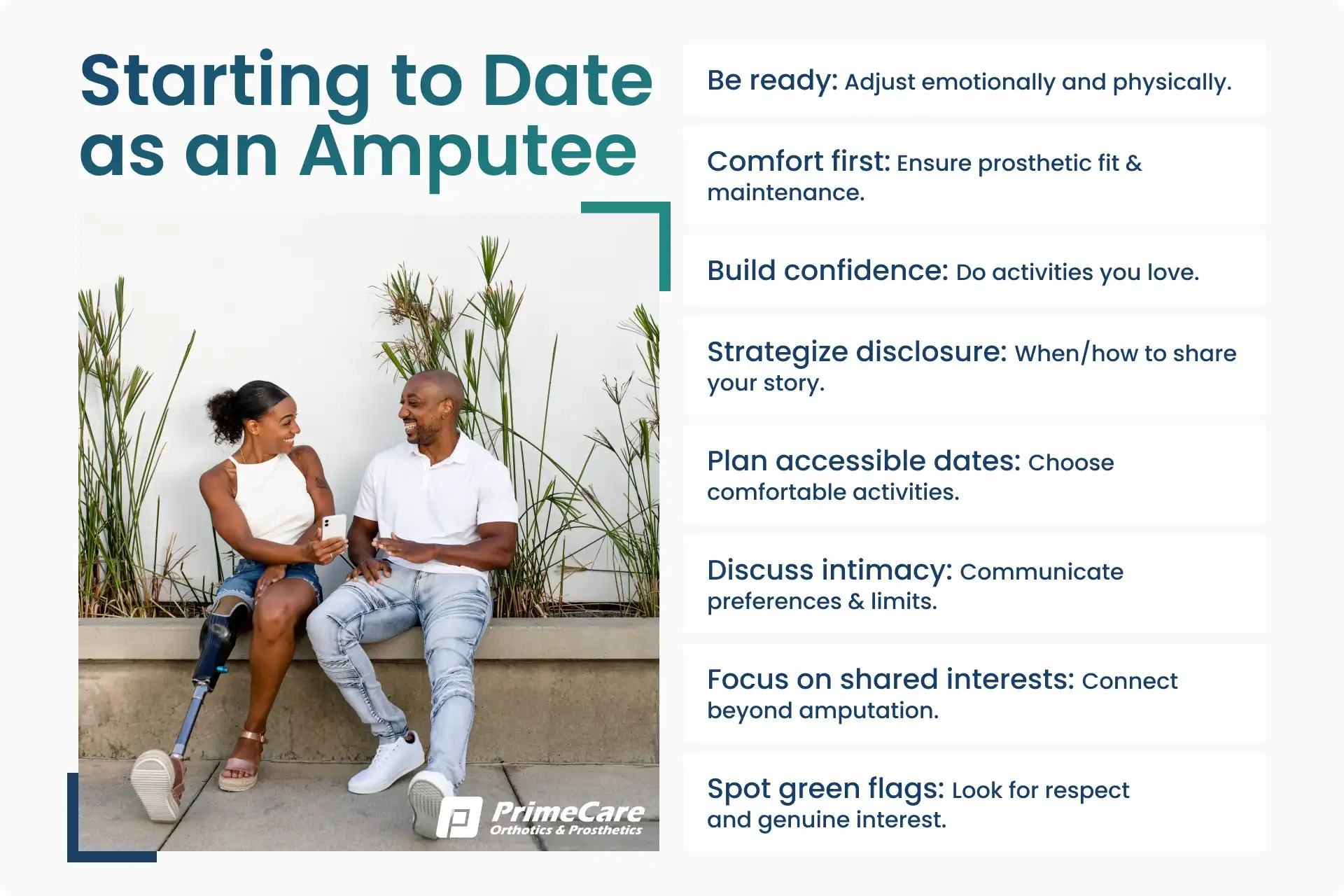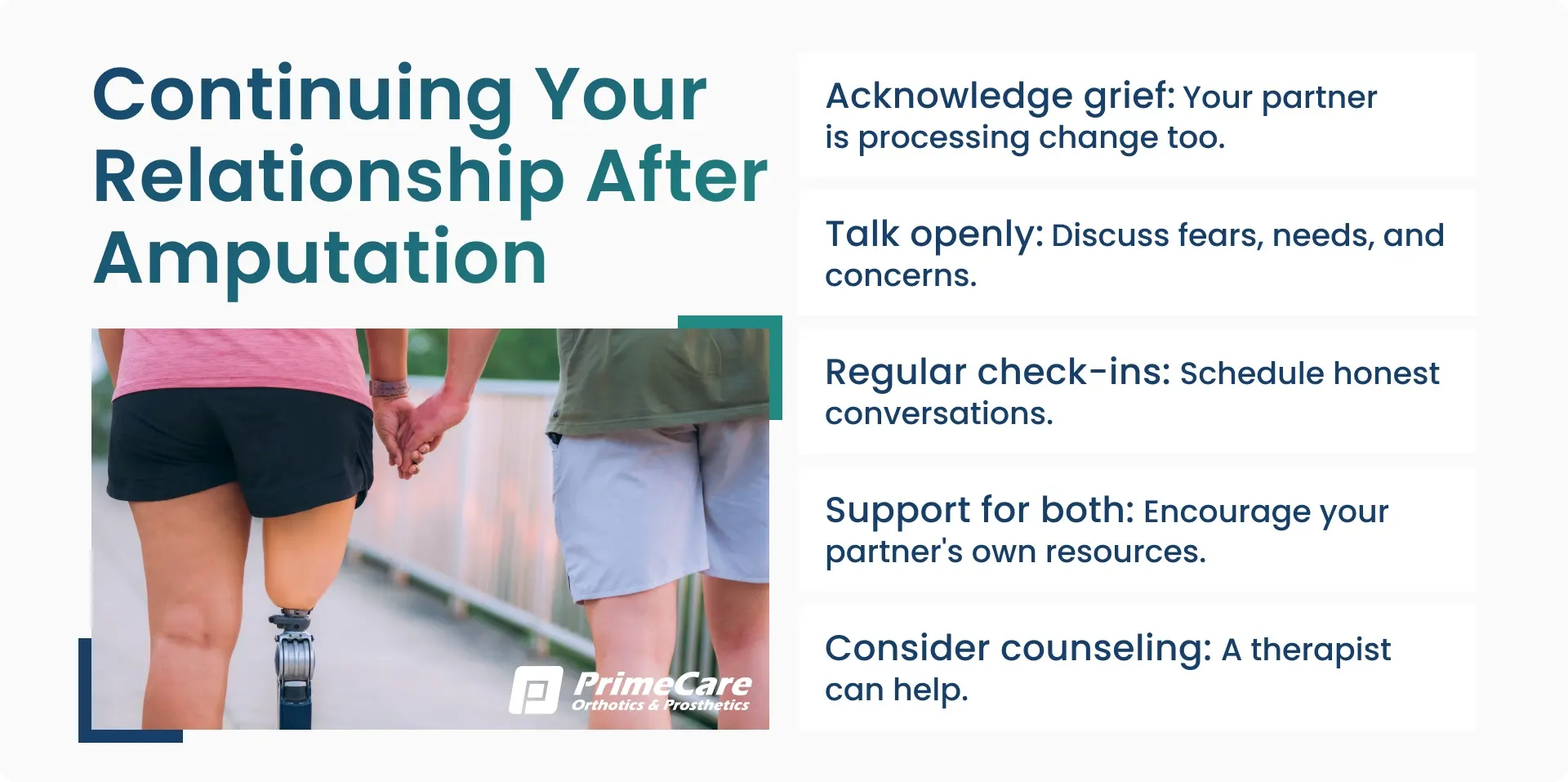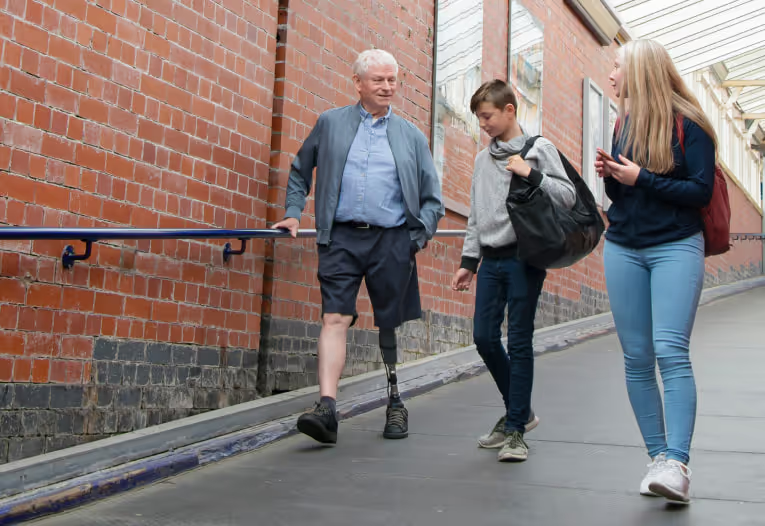The world of romance can feel intimidating for anyone, but for those who've experienced limb loss, the dating life presents unique considerations. Whether you're newly adjusting to life with a prosthetic leg or have been an amputee for years, stepping into the dating scene requires confidence and strategy.
At PrimeCare, we specialize in custom upper-limb and lower-limb prosthetics that help our patients live fully, including pursuing meaningful relationships. Here are our best tips for navigating the world of dating as an amputee.
Should You Date as an Amputee?

Simply put: absolutely. Your worth as a romantic partner isn't defined by having one leg or two, or whether you wear a prosthetic device. Many amputees worry that potential partners will focus solely on their physical difference, but the reality is far more encouraging. Thousands of amputees maintain fulfilling romantic relationships, and many have found love after their amputation.
The key is recognizing that while your amputation is part of your story, it doesn't write your entire narrative. Just as you've adapted to daily activities — perhaps through physical therapy and learning to use your prosthetic socket — you can adapt to dating with the same resilience.
Things to Know Before Dating with a Prosthetic Leg or Arm
Before downloading those dating apps or accepting that dinner invitation, consider these important factors that can smooth your path to romance.
Timing Matters
- Give yourself time to adjust emotionally and physically to your amputation before diving into dating — there’s no rush.
- Work with your prosthetist to ensure your residual limb is properly fitted and comfortable.
- Build confidence through activities you enjoy, whether that's cycling or gardening.
Disclosure Decisions
- Decide when and how to share your story — there's no universal right time.
- Some prefer mentioning it upfront in online profiles; others wait until meeting in person.
- Consider what feels authentic to you rather than following prescribed rules.
Physical Preparedness
- Ensure your prosthetic is well-maintained so you stay comfortable during dates.
- Know your limits — planning shorter first dates can prevent discomfort.
- Have backup supplies if you're going somewhere overnight.
Support Systems
- Connect with other amputees who've navigated the dating world successfully.
- Consider joining support groups specifically for dating and relationships.
- Remember that friends and family can offer valuable perspective.
Just because your amputation happened doesn't mean it has to define what happens next in your romantic life.
Dating Tips for Amputees: How to Get Started
Successfully navigating the dating world as an amputee involves a combination of practical strategies and self-assurance. Here are some approaches that have helped countless individuals build meaningful connections.

Choose the Right Platform
Not all dating environments are created equal. Online platforms offer control over initial impressions and disclosure timing. Apps like Bumble and Hinge allow detailed profiles where you can address your amputation if you choose. Some amputees include photos showing their prosthetics, while others focus on their interests and personality first.
In-person meeting opportunities through shared activities often feel more natural. From exercises at the gym to attending community events, these settings let people know you organically.
Master the Disclosure Conversation
At some point, you'll share your amputation story with your potential partner, and the timing is up to you. Keep it brief initially — most people are curious but respectful. A simple explanation like "I lost my leg in an accident three years ago and now use a prosthetic" usually suffices. Be prepared for questions, but set boundaries about what you're comfortable discussing. Don’t be afraid to have a sense of humor, it helps tremendously.
Plan Accessible Dates
When suggesting date activities, consider your comfort and mobility. Coffee dates, seated restaurant meals, or movies work well for first meetings. As relationships progress, communicate openly about activities that might require modifications. If you're invited to someone's house, for example, don't hesitate to ask about stairs or other potential challenges.
For active dates, leverage your experience with adaptive equipment. Many amputees enjoy showing potential partners that they can participate in various activities, from dancing to winter sports.
Handle Intimacy Conversations

Physical intimacy requires open communication for any couple, but this is especially the case when prosthetics are involved. Discuss preferences, any limitations, and what makes you comfortable. Many find that partners are more accepting and adaptable than anticipated. Some choose to remove their prosthetic during intimate moments, while others prefer keeping it on — there's no right answer. Do what feels right for you.
Build on Shared Experiences
There’s more to you than your amputation. Focus conversations on common interests, values, and goals. Your amputation might come up, but it shouldn't dominate every interaction or be all you talk about. Share stories about your work after amputation, travel adventures, or hobbies you've developed. This shows you're a complete person with diverse experiences.
Recognize Green Flags
A good potential partner will show curiosity without being invasive, treat you as a whole person rather than focusing solely on your disability, and demonstrate flexibility with plans. They'll see your strength in overcoming challenges.
Watch for someone who's interested in your full story, not just the amputation chapter.
Adjusting to Dating After Amputation When You Already Had a Partner
For those who were in a relationship when their amputation happened, the dating landscape looks entirely different. You're not meeting someone new — you're relearning intimacy with someone who knew you before. This journey brings its own complexities and opportunities for deeper connection.

- Your partner saw everything unfold: They witnessed your transformation from pre-amputation to learning to walk, sat through physical therapy sessions, and handled their own grief about the changes.
- The first months at home hit hardest: Your partner might freeze when trying to help, worried about hurting your residual limb, while you worry whether someone who decided to be with the old you still finds you attractive.
- Schedule weekly relationship check-ins: Set aside 30 minutes each week for both of you can say what's working and what isn't without judgment or defensiveness.
- Your partner needs their own support: Connect them with support groups for partners of amputees through organizations like the Amputee Coalition, because their feelings of loss and adjustment are valid too.
- Consider couples counseling early: Don't wait for problems to escalate; find a therapist experienced with disability to help you both process changes and find new ways to connect.
- Address the elephant in the room: Have direct conversations about fears, including whether they still find you attractive and whether you can still be the partner they need.
Even though the relationship that emerges after amputation might look different from what you had before, it doesn't mean the new relationship is worse. Many couples report developing a deeper sense of partnership and stronger emotional bonds after facing this challenge together. The key is giving both yourself and your partner grace during the adjustment period while working together toward your new normal.
Finding Love as an Amputee: Key Takeaways
Your amputation doesn't diminish your capacity for love or your desirability as a partner. The right person will see you — not just your prosthetic. When you build genuine connections and communicate openly, the right relationship will feel natural and fulfilling.
Ready to boost your confidence in the dating world? You can rely on our team for guidance. At PrimeCare, we create custom prosthetic solutions that can support your active lifestyle and help you pursue meaningful connections with comfort and confidence. We’re passionate about helping our patients live full and enjoyable lives. Contact us today for a free consultation!

.svg)
.svg)









